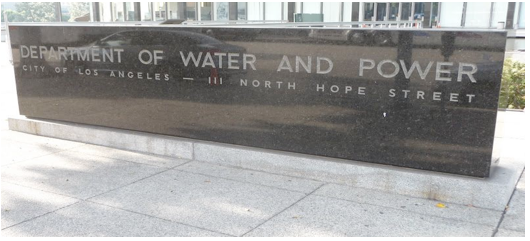CommentsEDITOR’S PICK--If you claim that the L.A. Department of Water and Power is a bloated, bureaucratic mess, you won't get much of an argument. Mayor Eric Garcetti, City Council president Herb Wesson and Councilman Felipe Fuentes have all said they want to make the department more "nimble" and "efficient" — and all are engaged in a debate over how best to do that.
But if you ask why the department is a mess, you run into trouble. To hear Fuentes tell it, the issue is political interference from City Hall and the city's cumbersome civil-service system. His proposed solution is to establish an independent governance structure and a new personnel system for DWP, both of which would separate it from City Hall.
Yet a recent report from the City Administrative Officer and the Chief Legislative Analyst offers a somewhat different diagnosis. The report finds that many of the causes of the DWP's inefficiency are internal to the DWP. Distancing the utility from City Hall would not solve those issues.
For instance, the report finds that it takes as long as two years to fill a vacant position. Vacancies are subject to an internal "bid process," whereby the most senior eligible DWP employee who bids for the position is automatically granted the job. If a manager does not want that candidate, the position may remain vacant indefinitely. Hiring of supervisors also is subject to veto by rank-and-file workers, which is exercised routinely.
Naturally, these rules make it difficult for the utility to hire people, or to consider candidates from outside the utility. That makes it more difficult to adapt to changing market conditions. All of these rules are the product of side agreements with the unions, and the unions would be loath to give them up.
"The primary disadvantage to removal of these rules is that negotiations will be very difficult," the report dryly notes.
"More than 95 percent of positions at DWP are IBEW 18," says Fred Pickel, the utility's ratepayer advocate. "They're the elephant in the room."
Pickel did his own report last year on the utility's billing fiasco, in which thousands of customers were overbilled and then forced to wait an hour or more to talk to a customer service representative. Pickel's report faulted the civil-service system and procurement processes but also blamed "labor rigidities."
"The DWP has a management-labor relationship that is unlike that of any other utility known to [the ratepayer advocate], and the result is that some practices are decades behind the times," Pickel wrote.
DWP management employees are represented by their own bargaining unit. Of the 8,700 employees at the utility, all but 20 belong to a union.
For many important decisions, management and labor have an equal vote. Pickel argued that arrangement creates an "imbalance," which has made it impossible for the utility to evolve into the 21st century.
"When two partners each have a vote, it is self-evident that they also each have a veto," he wrote. "Vetoes are biased toward the status quo."
Andrew Rea, a consultant who authored yet another report on the DWP for the city controller, offered a different take on the union. In his view, the IBEW should be treated as a "partner" in making the utility more flexible, and solutions can come from deeper labor-management collaboration.
"The union is a key stakeholder and does a lot of good," Rea says.
That report has influenced Councilman Fuentes' proposal. Fuentes' plan would allow the DWP and IBEW to establish their own hiring procedures, unrelated to City Hall's personnel system. But it would not address the issues internal to the DWP that were raised in the CAO/CLA report or in Pickel's report. In public hearings to discuss DWP reform, the role of the IBEW is almost never mentioned, except occasionally by angry members of the general public. (Fuentes has taken $35,000 from the IBEW for his state and local campaigns.)
Pickel argues that the utility urgently needs to rebalance its relationship to its union.
"They have to be better at adapting to changing business environments," he says, citing the rise of rooftop solar as an example of new competition. "They’ve had a nice, comfortable, growing monopoly for 100 years. Now it’s not growing. It’s not projected to grow in the next five years. ... Lots of things are likely to happen in the utility industry."
(Gene Maddaus wrote this piece for LA Weekly … where it appeared on April 21. He leaves the Weekly soon to write for Variety.)
-cw
Sidebar
Our mission is to promote and facilitate civic engagement and neighborhood empowerment, and to hold area government and its politicians accountable.

 CityWatch Los Angeles
Politics. Perspective. Participation.
CityWatch Los Angeles
Politics. Perspective. Participation.
28
Sat, Mar














